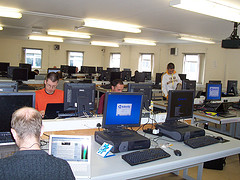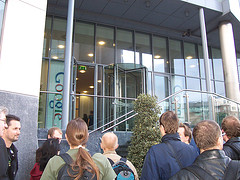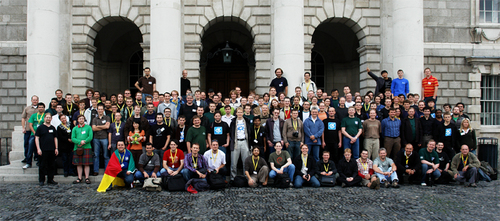aKademy Hackathon Starts as Contributors Conference Wraped-up
The KDE contributors conference part of aKademy 2006 in Dublin kicked off Saturday morning bright and early, much to the dismay of those who had been out late the evening before at the registration desk, conveniently located in a pub. Read on for a full report.
The inspirational Aaron Seigo started the conference off in a confrontational manner by looking the KDE project community in the eye and asking "who are we?". Punctuated by some awful music and a rapid-fire slide-show of contributors, Aaron outlined what he thought is the most important aspect of the KDE community:
Building communities around Free Software and bringing Free Software into communities.
This shows how we create code and exciting groups of people around those code products but also bring those products into communities where they are useful.
After Aaron's keynote, the 180 attendees spread out over two parallel tracks; the cross-desktop track contained talks on issues that affect all of the Free desktops out there. The cross-desktop technologies of DBus and Portland were explained briefly. We looked at standardisation efforts such as the Linux Standards Base and security issues in web browsers in general. Gnome's John Palmieri told us a nice allegory about inline skates manufacturers and how competition (on the desktop) and cooperation (in underlying technology) are not mutually exclusive. Embedded systems from open platform printer manufacturer Ricoh and the future of X with Keith Packard rounded out the cross-desktop lineup.
In the room opposite cross-desktop, the KDE4 track focused on new technologies for KDE4 and our user-centric workflow approach. Ellen Reitmayr kicked off the track by Keeping Users in Mind. After sketching some basic usability notions such as personas and the trade-off between features and happiness she examined the challenges faced by both application developers and library developers in incorporating usability advice into their designs.
John Cherry from the OSDL spoke about the state of the Linux desktop, in particular analysing multiple market studies and how that reflects on the uptake of Free Software in various (national) markets.
The community entered the fray at the end of the day with presentations by Claire, Martijn, Kevin and Inge. Organising KDE events was the topic Claire and Martijn addressed. This was a practical session with tips and checklists and a script for the organization of trade-show visits and developer sprints. Local groups events such as a BBQ can also gain benefits from such a structured approach. Kevin Krammer brought the message that providing *support* to individual users is an important aspect of being a developer - you can't hide from it. Selecting appropriate channels of communication is essential to making your users more comfortable when dealing with their support requests. Persistent channels such as forums can be preferable to ephemeral channels like instant messaging because they foster the creation of shared knowledge. Inge Wallin covered some basic marketing principles and gave suggestions about how to apply these to Free Software applications. He emphasised that communicating about your program and showing new developments, ideas and plans attracts new developers and users.

The hacker labs
On Sunday morning Anne Østergârd spoke about Women in Free Software and the efforts undertaken to increase the participation of women in all aspects of Free Software. This led to some lively discussion about what the KDE project in particular can do to help.
Eric Laffoon spoke about the question of "how do you eat" (what buys your cookies, for instance) and that a Free Software project needs to have some way of keeping its developers alive. Here, passionate developers (eager to learn and contribute) are even more important than skilled ones (who have the technical skills but not the passion). The messages from Inge's talk about communications returned, and the talk wrapped up with some fund-raising tips and techniques.
Coffee (with cookies, because the aKademy organisation team is really cool) followed, and then the Programming and Applications tracks started. Applications included the English Breakfast Network, the KDE code quality checking site, the best practices of the Debian team responsible for packaging KDE "extras", applications of KDE in schools and for craftsmen (a good example of how the KDE platform can really support the development of niche applications) and the state of KDevelop (tremendous technological innovations occur there).
Julian Seward showed remote virtual KDE execution by running a complete KDE session in Valgrind. This helps discover errors in running KDE code through Valgrind's suite of detection tools. Valgrind has grown into a complete simulation tool framework, now powerful enough to tackle software as complex as KDE is.
spectaKle is a new QtRuby/Korundum based application for doing digital signs and video on demand. We could have used this at aKademy itself to point participants to the right lecture hall during the day. As it stands, paper and pen had to do the job. It is a cool illustration of classical frustration with proprietary software development and the itch-to-scratch inspiration for Free Software.

Outside the Googleplex
Stephan Kulow showed the technical implementation of usability testing at Novell, where they videotaped users trying to perform a range of tasks with KDE. The puzzled look on the guys face when the k-menu doesn't do what he expected speaks volumes. It made us laugh, but also realise all the more that what we think is usable may not be so for people with different expectations or background. A new implementation of the K-menu was demonstrated, which was very impressive in how it integrated usability improvements with new and old features (like the hidden calculator in the miniCLI).
Slides are available by following the links from the timetable, write-ups from some of the talks are available and videos should be online soon. The photos wiki page lets you see the fun and for views and opinions remember to read Planet KDE.
On the Monday we enjoyed the hospitality of sponsors Google at their European headquarters for some very welcome food, beer and a fridge full of ice cream.
